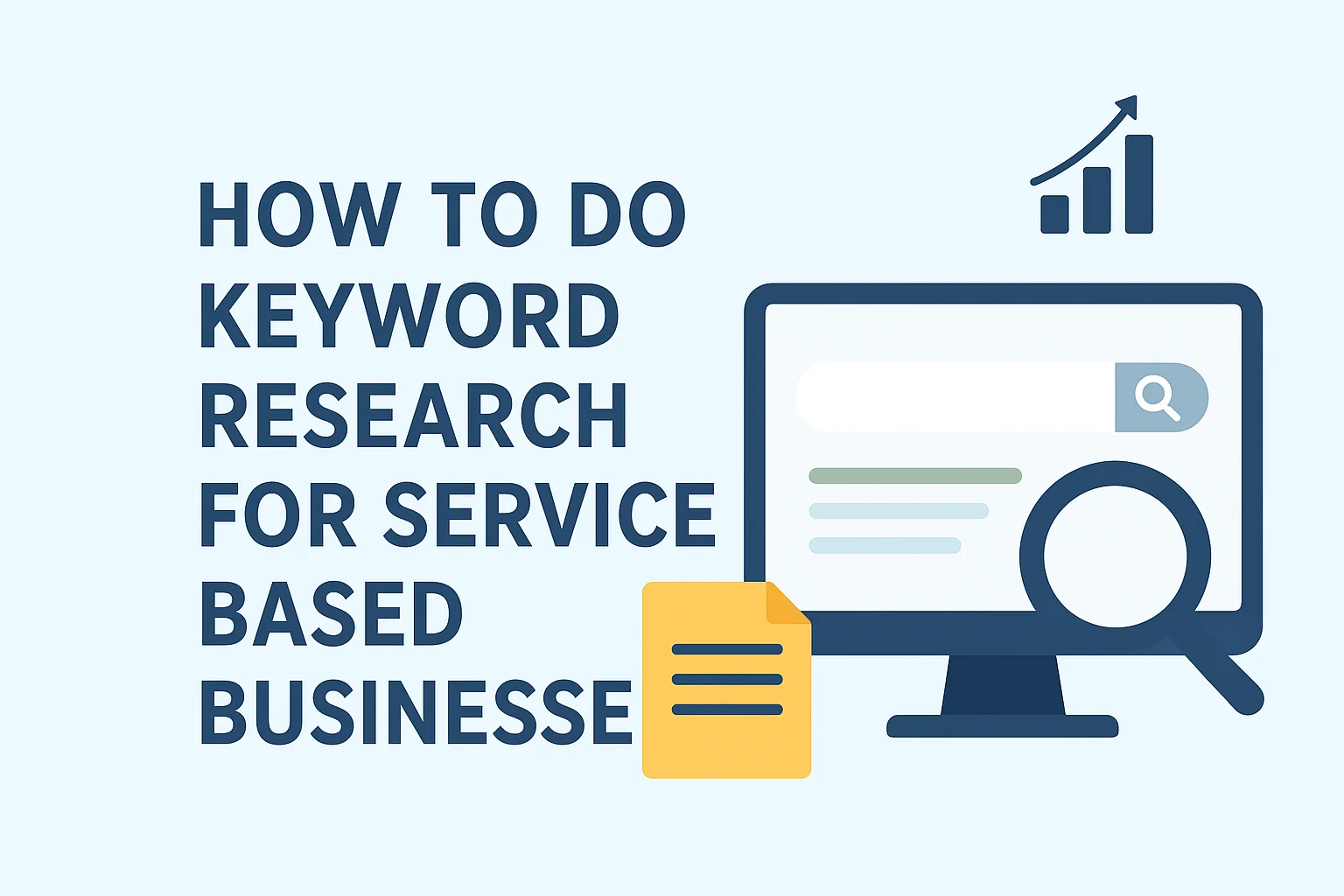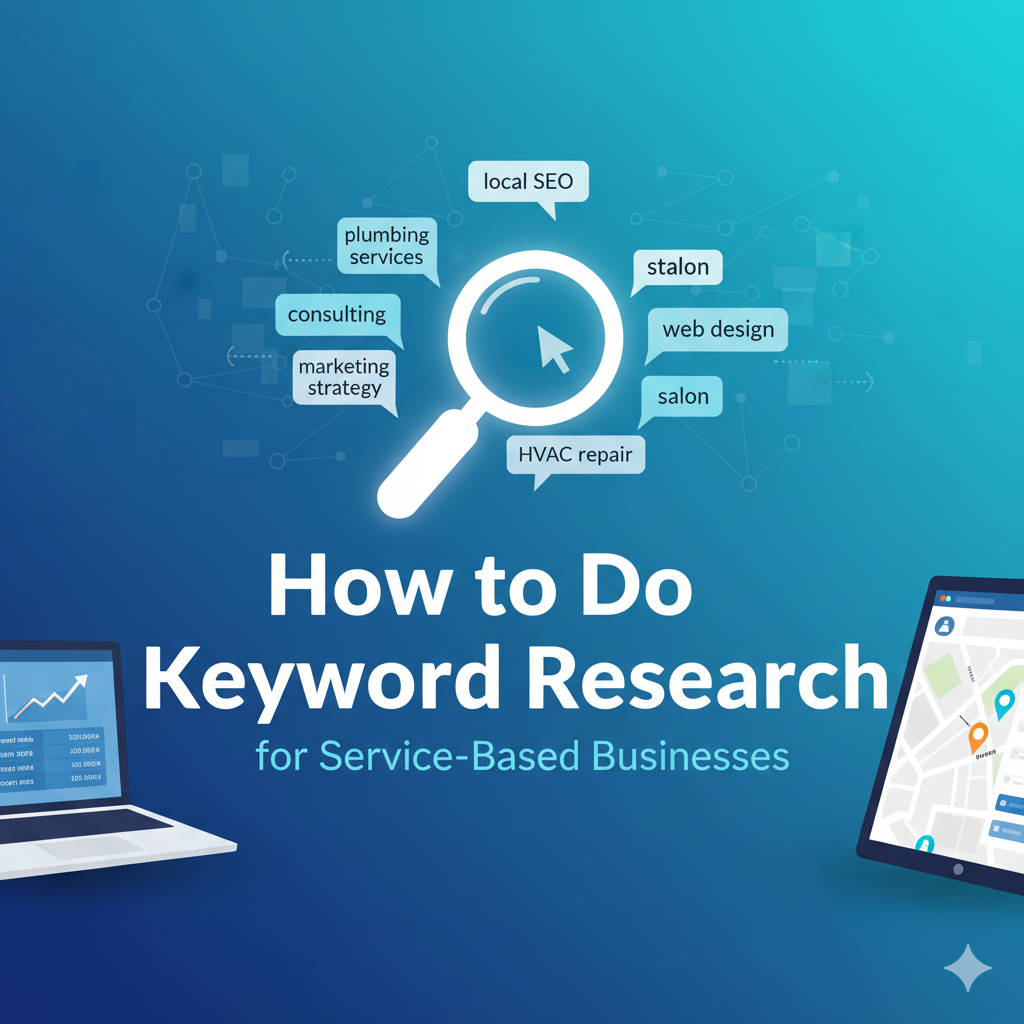Table of Contents
- Introduction
- Why Keyword Research Matters for Service Businesses
- Understanding User Intent
- Best Keyword Research Tools (Free + Paid)
- Step-by-Step Keyword Research Process
- Local Keyword Optimization
- Analyzing and Organizing Keywords
- Common Mistakes to Avoid
- Conclusion
- FAQ
Introduction
If you run a service-based business — whether you’re a plumber, lawyer, consultant, cleaning company, or personal trainer — your customers aren’t buying a physical product. They’re buying your expertise and service.
In the digital world, the first step to getting clients is being found online, and that’s where keyword research for service-based businesses comes in.
Keyword research is the process of identifying search terms that potential customers use to find services like yours. For service providers, it’s not about chasing millions of clicks — it’s about targeting high-intent keywords that bring you leads and sales.
But here’s the twist: Keyword research for service-based businesses is different from e-commerce. Why? Because service buyers often search with local intent, specific service needs, and urgency.
In this guide, we’ll break down a proven keyword research strategy specifically for service providers — from understanding search intent to finding local keywords that convert.
Why Keyword Research Matters for Service Businesses
When you know what your audience is searching for, you can:
– Appear in the right searches — whether in Google Search, Google Maps, or voice search.
– Get higher-quality leads — people searching “emergency plumber near me” are ready to buy now.
– Save on ads — focusing on relevant keywords lowers your PPC costs.
– Outrank competitors — especially local rivals who aren’t doing SEO.
Example:
A small accounting firm in London discovered that “self-employed tax return help London” brought in more calls than generic terms like “accounting services.” They optimized their Google Business Profile and website for that keyword, leading to a 40% increase in client inquiries.
Understanding User Intent
User intent means why someone is searching for something. For service businesses, it’s crucial to target people who are ready to hire.
Types of User Intent:
1. Informational Intent — Learning about a topic. Example: “What does a wedding planner do?”
2. Navigational Intent — Looking for a specific brand or service provider. Example: “BrightClean Cleaning Services reviews”
3. Transactional/Commercial Intent — Ready to hire or buy. Example: “Book wedding planner in Dubai”
Pro Tip: For service-based keyword strategy, focus 70% on transactional and commercial keywords, 30% on informational keywords for blogs and lead nurturing.
Best Keyword Research Tools (Free + Paid)
Free Tools:
– Google Keyword Planner — Great for basic volume and competition data.
– Google Trends — See seasonal patterns for services like “AC repair” or “tax consultant.”
– Ubersuggest — Keyword ideas + difficulty score.
– AnswerThePublic — Find question-based searches (perfect for blog topics).
Paid Tools:
– Ahrefs — Deep keyword data, competitor analysis, and SERP breakdowns.
– SEMrush — Ideal for tracking keyword rankings and local search insights.
– KWFinder (Mangools) — User-friendly for small businesses.
– BrightLocal — Local SEO-focused keyword tracking.
Example:
A law firm used Ahrefs to find that “no win no fee injury lawyer Manchester” had low competition but high intent — driving valuable leads.
Step-by-Step Keyword Research Process
- Identify Core Services — List your primary services.
- Expand with Keyword Modifiers — Add keywords like ‘near me’, ‘best’, ‘affordable’.
- Find Long-Tail Keywords for Services — Longer, specific phrases with lower competition.
- Check Search Volume & Difficulty — Aim for low-to-medium competition with clear commercial intent.
- Analyze Competitors — Search your main keywords and review their ranking pages.
- Organize Keywords by Intent & Priority — Group into primary and secondary keywords.
Local Keyword Optimization
For service-based businesses, local SEO keyword research is essential.
Why Local Keywords Matter:
– Most people search for nearby services.
– Google prioritizes local results for service-based queries.
How to Find Local Keywords:
1. Add location modifiers: city, neighborhood, ZIP code.
2. Use Google autocomplete — type your service + location.
3. Check Google Maps listings for competitors.
Optimizing for Local SEO:
– Include local keywords in your Google Business Profile.
– Add them to meta titles, headers, and service pages.
– Use local schema markup for better visibility.
Analyzing and Organizing Keywords
Once you have your list, structure them for clarity.
Example Table for a Home Repair Service:
Keyword | Search Intent | Volume | Difficulty | Page Type
emergency plumber near me | Transactional | 1,900 | Low | Service page
plumbing tips for homeowners | Informational | 700 | Medium | Blog post
affordable bathroom renovation Dubai | Transactional | 300 | Low | Landing page
Pro Tip: Always align one keyword group to one page to avoid cannibalization.
Common Mistakes to Avoid
– Targeting only high-volume keywords — Quality > Quantity.
– Ignoring long-tail keywords — They convert better.
– Not tracking performance — Use Google Search Console and rank tracking tools.
– Copying competitors blindly — Adapt keywords to your audience.
– Forgetting about user intent — Don’t rank for keywords that won’t bring leads.
Conclusion
Keyword research for service-based businesses isn’t about chasing traffic — it’s about finding the right traffic.
By understanding user intent, focusing on local SEO, and using a mix of free and paid keyword tools, you can consistently attract high-quality leads.
Key Takeaways:
– Start with your core services.
– Use long-tail, location-specific keywords.
– Prioritize transactional intent.
– Organize keywords by page type.
– Track, measure, and refine regularly.
Next Step: Create a keyword map for your business today and start optimizing your service pages for maximum local visibility.
FAQ
- Q: What is the best free keyword tool for service businesses?
A: Google Keyword Planner is a great free tool to start, but combine it with Ubersuggest or AnswerThePublic for more ideas.
- Q: How do I know if a keyword has buyer intent?
A: Look for words like ‘near me’, ‘book’, ‘hire’, or ‘service’ — and check the top-ranking pages.
- Q: Can I do keyword research without a paid tool?
A: Yes, you can use Google Search, Keyword Planner, Trends, and competitor analysis for free insights.
- Q: How do I find local keywords?
A: Use location modifiers, Google autocomplete, and competitor analysis in Google Maps.
- Q: Should I target informational keywords?
A: Yes, mainly for blogs to educate and nurture leads, not for main service pages.




